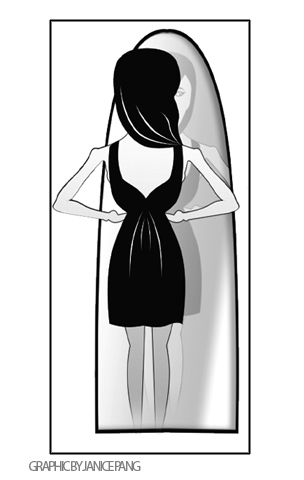
She examines herself in the mirror, letting her eyes focus first on her hair, then her eyes, then her nose. Slowly, she lets her gaze travel to the rest of her body. It is something that senior Zoe Bartlett does every morning, whether she wants it to happen or not. She shakes the image of herself out of her mind and goes through the process of changing her outfit multiple times. She wants to find the right clothes which will conceal her hips and her thighs from the rest of the world.
Bartlett never approved of what she saw. Instead, she would inwardly sigh and ask herself, “Why can’t my nose be a little bit smaller? Why can’t my legs be a little bit skinnier?” The question she never asked herself, however, was, “Why can’t I accept my body the way that it is?” This judgment, this self-resentment, had dug a hole deep into her confidence.
For others like Bartlett, self-confidence has always been an issue. In this day and age, self-consciousness is a disease that plagues the minds of young adolescents. According to a study conducted by the University of Colorado at Boulder, “young girls are more afraid of becoming fat than they are of nuclear war, cancer, or losing their parents.”
“Our age group has a problem defining itself,” says Junior Scarlett Wilson. “The media contributes a lot to [low self-esteem] because people judge their own self worth in comparison to people who they look up to, or who they think are better than them.” As in any case, there are good role models and there are bad role models. The clothing retailer Urban Outfitters proved to be one of the worst.
Earlier this summer, Urban Outfitters released a shirt that boldly stated, “Eat Less.” This shirt, promoted by a thin model on the retailer’s website, became a topic of controversy and public outcry.
In a recent blog post, One Tree Hill actress Sophia Bush publicly condemned Urban Outfitters, declaring, “I am sickened that anyone, on any board…would have voted ‘yes’ on such a thing, let alone…manufacture an item with such a hurtful message. It’s like handing a suicidal person a loaded gun. You should know better.” Bush has since launched a boycott against the retail chain until the company issues a public apology.
As a consumer of Urban Outfitters, Bartlett was also shocked at the retailer’s decision to produce the shirt and voiced a similar opinion, saying, “You already see so many magazines and TV shows indirectly advertising the ‘perfect’ body, but Urban Outfitters blatantly encourages eating disorders and unhealthy diet habits.” Bartlett explains that self-image issues are not only a result of advertisements and the media, but, “they also come from the student population. Judgment is inevitable, whether we like to admit it or not, and sometimes it gets the better of us and can severely affect others.”
Nevertheless, to freshman Amanda Blake, Aragon does not seem like a school obsessed with body image. “At Aragon, it’s not a contest of what you look like,” says Blake.
However, Bartlett disagrees. Although she is aware of the presence of such self-image problems at Aragon, she does not think that “anything major can be done” to fix it. “Self-consciousness and body image issues are something that students as individuals must overcome themselves,” says Bartlett. “But I think that as a community, students ought to just accept each other for who they are and how they look already because no one should be succumbed to ridicule for their weight or how he or she dresses.”
While the battle against Urban Outfitters to retract the shirt rages on, the war against self-consciousness is far from over. Although the issue of self-image is not a task which is easily overcome, perhaps the world would be a better place if we would take Bartlett’s advice and “just accept each other” for who we are.





